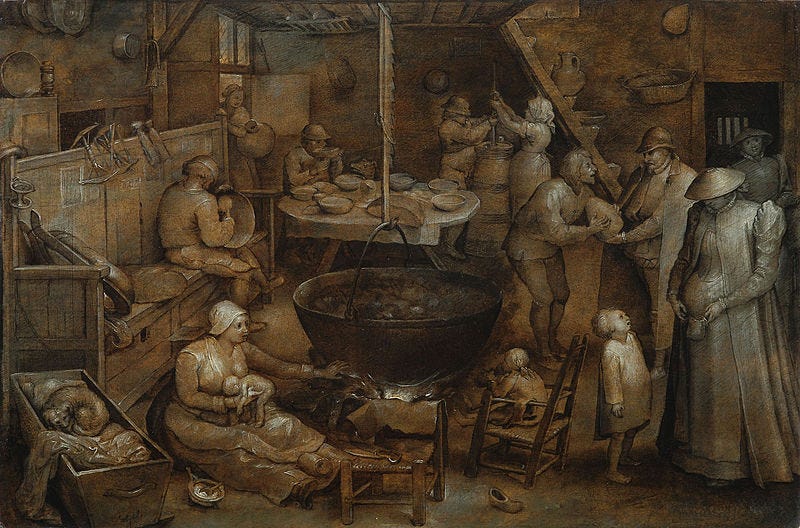Hello out there, all you who embody our Word of the Week! My father, who by preference sold insurance in the rural counties east and south and north of us rather than in our own urban and suburban county, always liked farmers, for their friendliness and their quite literally down-to-earth ways. The feeling was mutual, and that’s why he became so successful. Farmers stick together, so that if one fellow recommended my father for the service he provided him in pressing a claim against the company (which the company encouraged their agents to do), that meant that eight or nine other farmers might be happy to take him into their living rooms when he happened by. It’s odd but true, that farmers, not living cheek-by-jowl as townsmen do, but often separated by many acres, are the most sociable of people. Big barns are for sheltering and housing the cows and horses, but what’s their second purpose, if not for fiddlers and a dance? Or so it was in times past, and not so distant past.
Or maybe it’s the constant care for animals, even those that will go to serving the table, that gives the farmer a certain shade of sober kindliness, such as Debra’s Uncle Willard possessed; or the need to perform, every day, strenuous physical labor, that makes the farmer at once tough and resilient and unpretentious. And there is hardly a way to account for the blessings, mingled with hardship though they may be, of spending so many hours under the open sky, in sun and rain and snow, treading the rich crumbly soil, or up to your ankles in mud; probably the farmer is least prone to certain kinds of neuroses, those that you get when your quarters are too close and you are tempted to retreat into the nooks and crannies of fear and unmet desire and an unhealthy imagination. We can imagine Melville’s poor Bartleby as a scrivener in an office, staring at a wall. We can hardly imagine him as a farmer gauging the weather coming from the west. So, three cheers to all farmers! We can live without letters and offices. We can’t live without food. And we can’t be healthy without the sky.
In most languages, the word for farmer will have something to do with the soil. In Latin, the farmer is agricola, literally someone who turns round or cultivates the ager, the field (Latin ager is a cousin to English acre; for the correspondence of Indo-European g to Germanic k, see also Latin genu, English knee, Latin genus, English kin, Latin granum, English corn). In Greek, the farmer is georgos, literally, someone who works the earth. The ge- there gives us, by borrowing and coining, English geography, the writing down of the features of the earth, and English geology, reasoning about the earth. Georgos is also a name: hence Saint George, one of the most beloved of saints from the world of the early Church, whose name is to be found everywhere, as English George, Armenian Kevork, German Georg and Jürgen, Russian Yuri, Polish Jerzy, and so forth. And why should George not be beloved? He was a gentle warrior, who in legend saved the maiden by slaying the dragon. That legend gave Edmund Spenser the inspiration behind his wonderful first book of The Faerie Queene, in which the Knight of the Red Cross, who knows neither his true provenance nor his destiny, will learn that he is to be called “Saint George of merry England,” the patron of that land. “By George!” Englishmen have cried, since at least the time of Shakespeare.
But English farmer did not refer to the soil. It comes to us from the Norman French, and it suggests an economic relationship between the owner of the land and the fellow who was going to work it. The Norman lords quite often did none of that finger-soiling work. They left that to the English they had conquered. Hence, as Sir Walter Scott observed (I believe in his novel of strife between the Norman French and the native English, Ivanhoe), in English the word for the animal is native, but the word for the food you get from it is French, because the French and not the natives would be eating it. So we have Germanic sheep, but French mutton; Germanic cow, but French beef, Germanic deer, but French venison. Anyway, in French, a contract between the owner of property and the leaseholder was a ferme, and the holder himself was a fermiere, ultimately from Latin firma, a fixed (that is to say, firm) payment.
If you’re just renting your farm, you may look forward to the time when you will buy it and own it outright. But to buy the farm, in American military slang, meant that you “buy it,” that is, you die. Human languages are full of ways to make a jest of our enemy, Death — pushing up daisies, for example. I guess farmers, because of the work they do, are themselves great coiners of jesting phrases, such as “to buy a pig in a poke,” to “make hay while the sun shines,” to “shut the barn after the horse is out,” and so on. And long may their tribe prosper!














Share this post